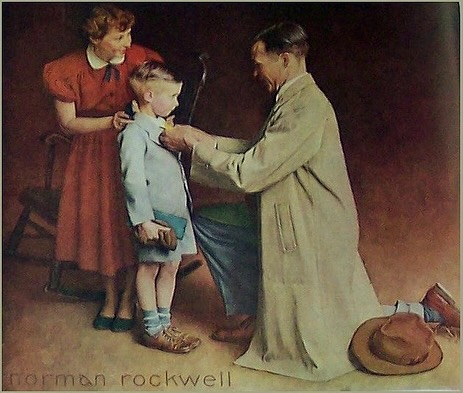When I was a child, the passage of time from one year to the next was marked, more than anything else, by the school year. A birthday or the turning of the calendar in January seemed arbitrary by comparison. Nothing dictated the rhythm of life more than the progression from one grade to the next.
As kids, we measured our peers more by grade level than age, which for most of us changed during the school year anyway. (“How old is Tommy? I don’t know but he’s in fourth grade.”) Many childhood memories are still associated with what grade I was in at the time, rather than my age or what year it was. (“That baseball tournament was the summer after my sophomore year.”)
Even the joy of every arriving summer was chiefly the joy of the impending freedom from school. Then the freshness of June would pass through the heat of July into the exhaustion of August and excitement for a new school year would grow. The return to school for a new year was always a thrill for me.
But every return was never merely a return. Each year would bring a new teacher, maybe a new classmate or two, new expectations, new subjects to study. Three times in my life, a return to school meant an entirely new school, twice in a new state. But always there was the same steady progression, the inevitable (more or less), inexorable advance from one grade to the next. Onward and upward.
I first realized just how large a role the rhythm of the school year played in my own sense of the passage of time when, having graduated from college, I was suddenly and keenly aware that, for the first time since almost as far back as I could remember, there was no predetermined plan for “next year.” The steady onwards and upwards of my youth had unexpectedly (somehow) opened into the vast, unmarked plateau of “adulthood.” How could one possibly fill all the undifferentiated years that lay ahead?
Two decades later, and it is back-to-school time once again. My own children are returning to the classroom – two of them to new schools. These weeks are new and exciting (and a bit scary, too) for them. In my house, as I imagine is the case in most houses with children, the excitement and chaos of these days is tempered, at least for us parents, by that most wondrously cliched thought: Where did the time go?

Growing older is the most ordinary of human experiences. But it still only happens to each of us once. Watching your children grow from wrinkled newborns to boisterous kids, and then into young men and women is ordinary, too. How is it that something as predictable and ordinary as watching children grow up can be a source of unfathomable surprise and wonder? How can this most natural and expected reality be so bittersweet? How can reflecting on something so small as to seem almost trivial – the mere passage of time – be so deeply affecting?
It might be tempting to dismiss all this as so much sentimentality. Perhaps there is some of that in it. But the fact that small and ordinary moments can wrench the human soul as much as great and extraordinary events ought to tell us something about the sorts of creatures we are.
There is something incommunicable between one generation and the next. No young person can possibly know what it is like to experience the passage of time as an adult has experienced it. No child ever really understands what it is like to be on the far side of youth, to know both youth and its loss. They say the past is a foreign country. It turns out it is quite difficult for those of us who have been there, to describe it in a way that someone who wasn’t can understand.
For parents in particular, there is sadness in that incommunicability. Children often want to know what the world was like before they arrived in it. Every parent, far more than simply wanting to tell stories of the glory days, wants to be able to communicate to their child everything good. But some good things cannot be told, and many other good things cannot be understood until they have been learned through bitter experience. Whatever is received is received in the mode of the one who receives it, as the philosophers say.
Parents will always find a limit to the love they would give their child – a limit set not by the parents themselves but by their beloved child and by time. Our love is at their mercy, though they do not know it. They eventually outgrow us, if all goes well, and then it is their turn to learn the cost and inexpressible joy of a parent’s love.
This communication of love – this language of love – is a humbling thing to learn, as much in learning to hear it as to speak it. It is hard enough to express, through words let alone deeds, all that one would express to our beloved. Even to try is to confront one’s own inadequacies and failings. We reverence those who teach us to speak the long, slow language of love. We cherish those who patiently teach us to hear it among the din of the world.
In all this, as in all things, there is an echo – and more than an echo – of the God who loves us first. Our time-bound-ness, even our freedom are all limits (albeit, limits of His own design) to our ability to receive what He would give to us. But His patience and mercy never falter. The Father sends the eternal Word into the seemingly inescapable confines of time and space. He humbled himself, entering creation, to communicate to us every good thing. He came to teach us the language of the Father’s love.
__________















